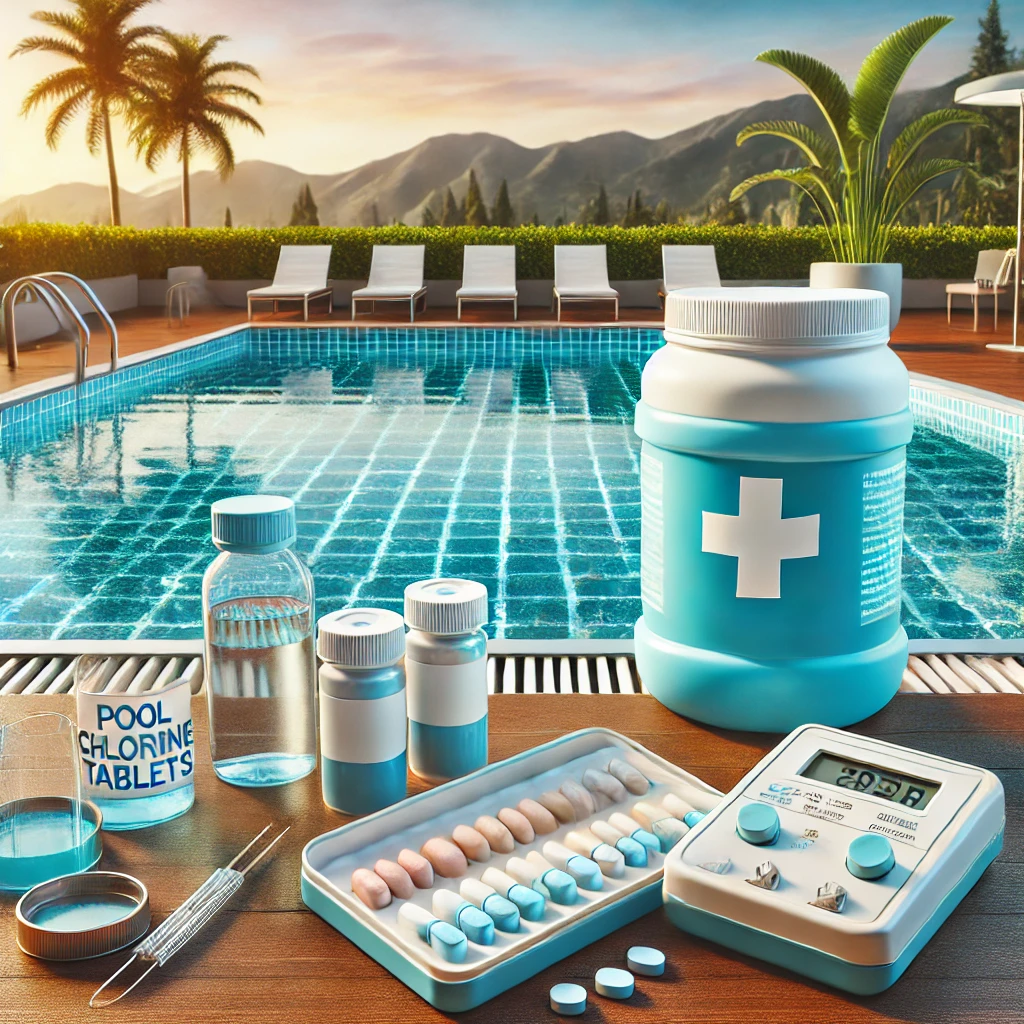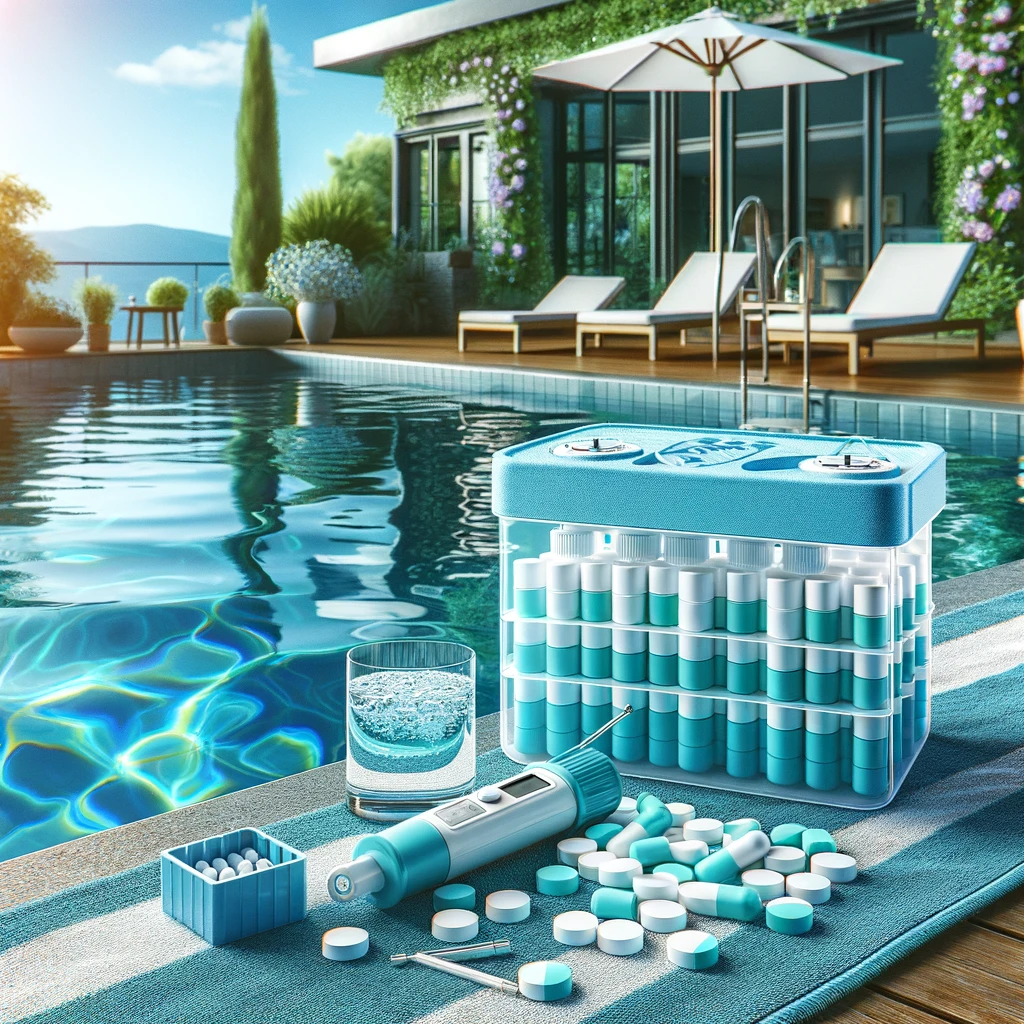Maintaining a pool’s water quality is essential for a safe and enjoyable swimming experience. Pool chlorine tablets are a proven method for ensuring water stays clean and free from harmful microorganisms. However, using chlorine for pools effectively over the long term requires careful management. In this article, we will discuss how to use pool chlorine tablets to maintain the long-term stability of pool water quality.

I. Understanding the Role of Chlorine Tablets
1. What Are Pool Chlorine Tablets?
Pool chlorine tablets are a primary tool for disinfecting pool water. They slowly dissolve, releasing chlorine into the water. This chlorine kills bacteria, algae, and other harmful microorganisms, keeping the pool safe for swimmers.
2. Why Chlorine Is Essential for Pools
Chlorine for pools is crucial because it continuously sanitizes the water. Without it, pools can become breeding grounds for harmful bacteria and algae. Chlorine not only maintains cleanliness but also ensures the water is safe for swimming.
3. The Importance of Consistent Chlorine Levels
Maintaining consistent chlorine levels is key to ensuring long-term water quality stability. Fluctuating levels can lead to periods where the pool is either under- or over-sanitized, compromising water quality and safety.
II. How Chlorine Tablets Contribute to Long-Term Water Quality
1. Slow and Steady Chlorine Release
Pool chlorine tablets dissolve slowly, providing a consistent release of chlorine. This steady supply ensures that chlorine levels remain stable, preventing sudden drops that could lead to water quality issues.
2. Preventing Algae Growth
Algae growth is a common issue in pools, especially in warmer climates. Chlorine for pools helps prevent algae from taking hold by maintaining an environment that is hostile to their growth. Regular use of pool chlorine tablets keeps the water clear and free from green or murky conditions.
3. Reducing Bacterial Contamination
Bacterial contamination can lead to health risks for swimmers. Pool chlorine tablets work continuously to kill bacteria, ensuring that the water remains safe. This is particularly important in public or frequently used pools, where bacterial load can increase rapidly.
4. Minimizing Organic Contaminants
Organic contaminants, such as body oils, sweat, and sunscreen, can accumulate in pool water. Chlorine for pools oxidizes these contaminants, breaking them down and preventing them from clouding the water or affecting its quality.
III. Best Practices for Using Chlorine Tablets
1. Use a Chlorine Dispenser
A chlorine dispenser, or floater, is an effective way to distribute pool chlorine tablets evenly. This device allows the tablets to dissolve slowly, ensuring that chlorine is released consistently throughout the pool. Using a dispenser also prevents the tablets from sitting directly on the pool surface, which can cause staining.
2. Regularly Test Chlorine Levels
Regular testing is crucial to maintaining the right chlorine levels. Use a pool testing kit to check the chlorine levels at least once a week. This practice ensures that chlorine for pools is working effectively and that levels are within the recommended range.
3. Adjust Chlorine Dosage Based on Pool Usage
The amount of chlorine needed can vary based on how often the pool is used. During periods of heavy use, more pool chlorine tablets may be required to maintain water quality. Conversely, during times of low usage, you can reduce the dosage to avoid over-chlorination.
4. Balance pH Levels
For chlorine for pools to work effectively, the pH level of the water must be balanced. A pH that is too high or too low can reduce chlorine’s effectiveness. Regularly test and adjust the pH to keep it within the ideal range of 7.2 to 7.8.
IV. Long-Term Maintenance Tips for Pool Water Stability
1. Shock the Pool Regularly
Even with regular use of pool chlorine tablets, it’s important to shock the pool periodically. Shocking involves adding a higher dose of chlorine to eliminate any residual bacteria, algae, or contaminants that regular chlorination might miss. This helps reset the water’s chemical balance and ensures long-term stability.
2. Monitor Stabilizer Levels
Stabilizers, such as cyanuric acid, protect chlorine from being degraded by sunlight. However, too much stabilizer can reduce chlorine’s effectiveness. Regularly monitor stabilizer levels to ensure they are within the recommended range. This balance helps maintain the long-term effectiveness of chlorine for pools.
3. Clean and Maintain Pool Equipment
Regular maintenance of pool equipment, such as filters and pumps, is essential for maintaining water quality. Clean and inspect the equipment regularly to ensure it is functioning properly. Well-maintained equipment works efficiently with pool chlorine tablets to keep the water clean.
4. Educate Pool Users on Proper Hygiene
Encouraging good hygiene practices among pool users can significantly reduce the introduction of contaminants. Simple steps, like showering before entering the pool, can help maintain water quality. This reduces the workload on chlorine for pools and contributes to long-term stability.

V. Conclusion
Pool chlorine tablets are a vital tool for maintaining the long-term stability of pool water quality. By providing a consistent release of chlorine, they help prevent algae growth, reduce bacterial contamination, and minimize organic pollutants. However, proper use and regular maintenance are essential to maximizing their effectiveness. By following best practices, such as using a chlorine dispenser, regularly testing water chemistry, and maintaining pool equipment, pool owners can ensure that their pool remains clean, clear, and safe for the long term. With the right approach, chlorine for pools offers a reliable solution for ongoing water quality management.




